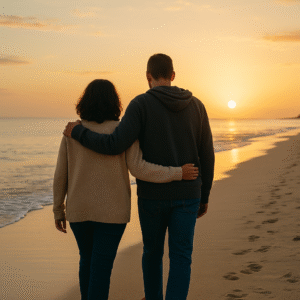Recovery is a process built on connection, but that doesn’t mean the experience always feels social, supported, or easy. Many people in early and intermediate recovery report periods where they feel isolated even when they are surrounded by others. This can happen for many reasons. Maybe friendships changed when you stopped using. Maybe your routines look different now. Maybe the people around you don’t fully understand what you are working through. Feeling lonely in recovery is normal, but it is also something you can actively address.
Below are practical ways to reconnect with others, strengthen your support system, and create a sense of belonging that supports long term sobriety.
1. Start with one reliable person
You don’t need a big circle of friends to feel connected. Sometimes what really matters is one person who can show up consistently. This might be a family member, a sponsor, a therapist, or another person in recovery. Research shows that even a single supportive relationship can improve overall well being and reduce feelings of isolation. If your circle feels small right now, that is completely okay. Focus on nurturing the connection you do have.
If you need help identifying who that person could be, this article from the Substance Abuse and Mental Health Services Administration offers guidance on building recovery support networks.
2. Rebuild relationships slowly and intentionally
Many people feel pressured to “fix” every strained relationship all at once. This pressure can make you want to withdraw from everyone. Instead, try approaching reconnection in small steps. Reach out, check in, or offer a simple apology if appropriate. You do not owe anyone a perfect version of yourself. You are allowed to grow at a sustainable pace.
Our blog on setting boundaries during recovery can also help you rebuild relationships without feeling overwhelmed.
3. Join structured group spaces
When you are feeling disconnected, socializing casually can feel intimidating. Structured spaces like therapy groups, IOP, DNT, or recovery meetings provide connection without the pressure to perform or pretend. These environments give you a place to talk openly and hear from people going through similar experiences. Many people who felt entirely alone before treatment describe these groups as the first places where they finally felt understood.
4. Practice “paired activities” instead of big social events
You don’t need to jump into large gatherings or loud social settings to rebuild connection. Start with paired or small group activities that feel safer. Examples include walking with a friend, cooking a meal together, going to a meeting, or attending a class. These kinds of activities provide bonding without overwhelming you.
5. Let your schedule work for you, not against you
Unstructured time can make loneliness feel more intense. Small routines can anchor your day, especially during seasons when life feels chaotic. Consider setting aside specific times for movement, journaling, meetings, or phone calls. If your routine is predictable, your connections become easier to maintain.
6. Connect even when you don’t feel ready
There will be moments when connection feels uncomfortable or inconvenient. Many people experience emotional “pushback” when they are working through shame, guilt, or anxiety. When that hesitation shows up, try reaching out anyway. Send a text. Sit in on a group. Say yes to something small. Often, connection feels better once you are actually in it.
7. If the isolation feels deeper than usual, check in with a professional
Sometimes isolation comes from something more than loneliness. Depression, anxiety, trauma, and seasonal changes can also make you withdraw. A therapist can help you recognize what is underneath the feeling and help you build strategies that work for your life.
You do not have to figure everything out alone. Support exists, and connection can grow again, even if reshaping your life feels overwhelming right now. You deserve relationships that help you heal.
If you or someone you love needs support, Sarasota Addiction Specialists can help.
Call us at (941) 444-6560 or visit www.sarasotaaddictionspecialists.com



